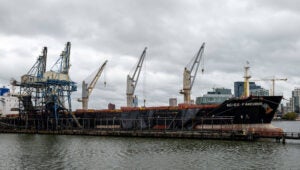The Port of Baltimore is the nation’s largest port for farm equipment, and it is a significant throughway for raw sugar, meat, and timber, as well as soybeans, grains, and other agricultural products. Experts say that the collapse of the Francis Scott Key Bridge earlier this week, which has halted all vessel traffic, is likely to have a ripple effect that will negatively impact the ag sector.
“Now’s the time that a lot of farmers are getting going,” Alice Kassens, an economics professor at Roanoke College in Virginia, told TV news station WDBJ. “It’s when people are likely going to be buying this type of equipment. And so, there’s going to be shortages, which push up the price of those items.”
Maryland’s government’s website explains that Baltimore’s proximity to the Midwest’s major farm and construction equipment manufacturers has helped it become the leading U.S. port for combines, tractors, and hay balers, with more than 1.3 million tons of roll on/roll off equipment handled in 2023 alone. It is also a key port for light-duty pickup trucks.
According to DTN, customers at the port include Case IH, New Holland Agriculture, John Deere, AGCO (Fendt, Massey Ferguson), and CLAAS.
Kassens warned that the equipment issues could be costly for farmers and others involved in agriculture because delays in machinery and parts arrivals could negatively impact planting timelines, as well as drive up the price of the equipment itself that has to be rerouted and face unexpected transportation needs.
While the collapse is a concern for machinery companies, it’s too early to predict the overall effect the port blockage will have, Megan Tanel, the president of the Association of Equipment Manufacturers, told Lancaster Farming.
With inventories that are more robust a few years after the COVID-19 pandemic, she noted that there’s less concern over the short term, but longer-term issues could arise if the bridge’s rebuilding process takes a long time.
And while the port does major business with farm equipment, it handles other ag products, too.
According to the U.S. Department of Agriculture, the Port of Baltimore moved a total of more than 38 million tons of cargo annually, of which 213,000 metric tons were agricultural products. That ranks the port 29th in the nation for waterborne agricultural exports, based on 2017 numbers, the latest available from the Agricultural Marketing Service.
Until the bridge is cleaned up and the waterways cleared again for travel, it is likely that shipping will be diverted to other major East Coast locations, like the Ports of New York/New Jersey, Boston, Virginia, or Jacksonville.
“The collapse of the Key Bridge is a global crisis,” Maryland Gov. Wes Moore said at a Wednesday news conference. “The national economy and the world’s economy depends on the Port of Baltimore.”



